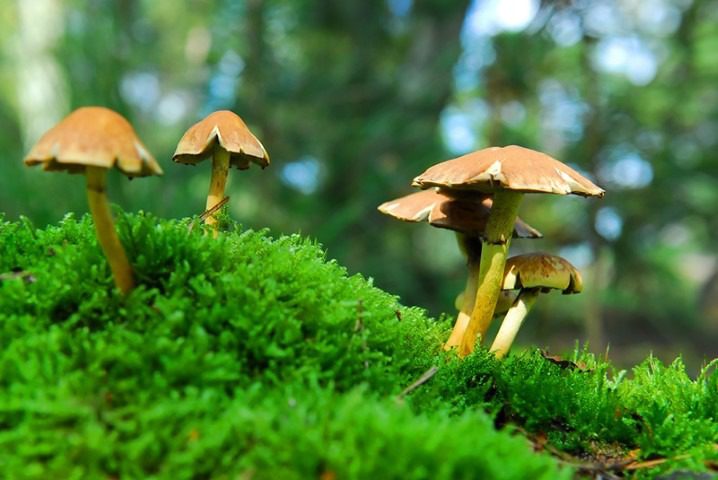Psilocybin Mushrooms and the Inner Journey
Terence McKenna was an American author, philosopher, and ethnobotanist who is well known for his research and exploration of the use of psilocybin mushrooms. He believed that the use of psilocybin mushrooms had the potential to alleviate anxiety, depression, and foster self-love.
McKenna claimed that the use of psilocybin mushrooms allowed individuals to explore their inner worlds, confront their fears and anxieties, and develop a greater sense of self-love. He believed that the experience of taking psilocybin mushrooms could be transformative and help individuals gain a deeper understanding of their own consciousness and the world around them.
McKenna’s research on the use of psilocybin mushrooms is based on his own experiences as well as those of those who have used the mushrooms. He described the effects of psilocybin as profound and claimed that they could lead to a heightened sense of awareness and a deeper connection to the natural world.
In addition to their therapeutic potential, McKenna also believed that the use of psilocybin mushrooms could lead to greater creativity, increased spiritual insight, and a deeper understanding of the nature of reality. He argued that the experience of taking psilocybin mushrooms could be viewed as a form of spiritual exploration and had the potential to help individuals develop a more holistic and interconnected view of the world.
Terence McKenna was a visionary who believed in the transformative potential of psilocybin mushrooms. Through his extensive research and personal experiences, he claimed that the use of these mushrooms could help individuals overcome anxiety, depression, and develop a deeper sense of self-love. His ideas and perspectives continue to inspire and influence many individuals today.
Terence McKenna believed that psilocybin mushrooms had great potential for psychotherapy. He believed that consuming psilocybin could help individuals overcome a variety of mental health issues such as anxiety, depression, and trauma.
Why is it dangerous to be too kind?
The use of psilocybin in therapy has become increasingly popular in recent years, with a growing body of research suggesting that it may be effective in treating a variety of mental health conditions. This is due to psilocybin’s unique properties, which can alter perception and provide a deep sense of spiritual connection.
Studies have shown that psilocybin-assisted therapy can help individuals cope with and process traumatic experiences, reduce anxiety and depression, and improve overall well-being. The experience of consuming psilocybin can create a safe and supportive environment in which individuals can examine their thoughts and emotions, leading to greater self-awareness and insight.
Additionally, psilocybin has been shown to increase neuroplasticity in the brain, allowing new neural pathways to be formed and old ones to be strengthened. This can help individuals break free from negative thought patterns and improve their overall mental health.
McKenna’s focus on the psychotherapeutic benefits of psilocybin highlights the importance of exploring alternative approaches to mental health treatment. Although more research is needed, early results of psilocybin-assisted therapy are promising and suggest that this approach could play an important role in the future of mental health treatment.
The Use of Psilocybin in Psychotherapy
The use of psilocybin in psychotherapy has become increasingly popular in recent years and is the subject of numerous studies. These studies have led to several important findings about the potential benefits of combining psilocybin with psychotherapy.
One of the most recent findings is that psilocybin can have a rapid and long-lasting effect on depression and anxiety. In several clinical trials, patients who received psilocybin in combination with psychotherapy reported significant reductions in symptoms of depression and anxiety, and many reported lasting improvements even after several months.
Another important finding is that psilocybin can enhance the therapeutic process by increasing emotional openness and reducing resistance to change. Psilocybin can create a state of introspection and self-reflection that can be used in therapy to help individuals gain new insights and perspectives on their problems.
In addition, psilocybin has been found to increase neuroplasticity in the brain, which is the brain’s ability to change and form new neural connections. This has led to a growing interest in the use of psilocybin in the treatment of addiction, as it can help individuals break free of negative behavior patterns and build new, healthier habits.
Overall, the latest research into the use of psilocybin in psychotherapy is promising and suggests that this approach may play an important role in the future of mental health treatment. However, more research is needed to fully understand the therapeutic potential of psilocybin and determine the best ways to use it in the clinical setting.

Keywords: psilocybin mushrooms, psilocybin, psychotherapy, Terence McKenna, inner journey, crazy mushrooms, Licensed therapist near me in Manhattan NYC, Affordable therapy services in New York State, Holistic psychotherapy sessions in NYC, Somatic Experiencing therapy for trauma recovery in New York City, NARM therapy in Brooklyn, Licensed couples therapy in Manhattan, Gestalt therapy near me in NYC, Marriage counseling in Queens NYC, Therapy for anxiety treatment in NYC, Experienced psychotherapist in New York, Licensed psychotherapist near me in NYC, Somatic Experiencing therapy sessions in New York, Trauma therapy and counseling in Manhattan, Gestalt therapy sessions in New York City, Therapy sessions for emotional regulation in New York, Trauma therapy near me in Brooklyn New York, Licensed mental health therapist in Manhattan NYC, Depression therapy in New York, New York City therapist experienced in PTSD treatment
*Photo: Shutterstock
*Contact: Make an appointment
*For companies: Creative manager
Compassion towards yourself








